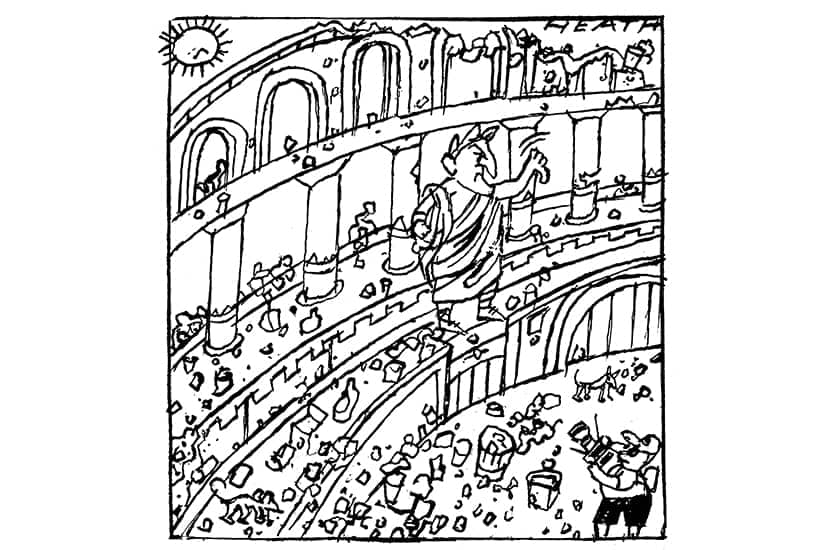‘Excommunication,’ reads a stone plaque on the wall of the church of St Theodore in Rome, ‘and a fine of 200 gold ducats for any person who should dare to unload… waste of any kind and cause a stink outside these precincts.’ This threat might have worked when the plaque was erected in 1703, but it certainly doesn’t work now. A few paces down the street, a waist-high pile of stinking rubbish bags festers in the autumn sunlight, pecked at by seagulls. In Rome, even the rubbish is eternal.
Italy’s capital is strewn with litter — geological layers of the stuff. In a pile of last year’s crumbled leaves by my house on the Tiber embankment I found a beer bottle with a sell-by date of September 2020. Wild boar — Rome’s equivalent of London’s urban foxes — have been invading outlying districts to feast on rubbish. In May a family of boar were filmed attacking a woman in a supermarket car park and stealing her shopping. But rubbish is not just unsightly and unhygienic — it’s also become a major political issue that raises profound questions about whether Italy’s institutions are fit to govern.
Over the summer, anger over piles of uncollected refuse brought thousands of protestors out on to the streets. Hundreds more turned out at new landfill sites to protest against the dumping of Rome’s waste in their back yards. Clearing rubbish was a key issue on which the former mayor, Virginia Raggi of the radically anti-establishment Five Star Movement, was elected in 2016. Her failure to tackle the problem led to her downfall in elections this month.
Rome is also conspicuously full of trash collectors. They career down the narrow backstreets of Trastevere in miniature Transit-van-sized dustcarts and nose around the city’s squares nightly in noisy sweeping machines. Yet the general level of rubbish never seems to subside. Everyone has a theory as to why. ‘Corruption, of course,’ says Giulio Stalla, a restaurant owner in Trastevere, with a chop of the hand. ‘The mafia controls it all.’ ‘It’s the tourists,’ says 79-year-oldVittore Michelotti, a lifelong Rome resident. ‘A city of three million has to clean up after 30 million annual visitors.’ ‘It’s the unions,’ says Maria Strada, a supporter of the far-right Fratelli d’Italia (‘Brothers of Italy’) party who attended a protest last week at the Circus Maximus against Italy’s vaccine mandate laws. ‘Everybody wants to get paid, nobody wants to work.’
In fact, they are all correct. On coming to power, Raggi had to clean the Augean stables of inefficiency, dishonest bookkeeping and corruption that had beset Rome’s waste collection agency, AMA. Several private companies with alleged links to organised crime lost their contracts, and AMA was equipped with shiny new machinery. But Raggi was unable to break the politically powerful public sector labour unions and their bizarre restrictive practices. Our local bins on Piazza della Rovere, for instance, receive daily visits from various municipal vans dedicated to collecting different sorts of rubbish. But if the glass recycling bin happens to be full of general trash, they tip it out on the pavement, collect the empty bin and drive off. On days when there are no bins, locals just heap their black bags in a pile.
Then there’s the issue of litter urns. The old pillar-box-sized cast-iron municipal urns — emblazoned ‘SPQR’ for ‘The Senate and People of Rome’ — were removed en masse from the city centre after a terrorist group calling itself the Informal Federation of Anarchy left a bomb in one in 2010. Several dozen now stand forgotten, like a tribe of rusting Daleks, under the Belvedere on the Gianicolo hill. They were replaced by transparent plastic bags — which became hanging smorgasbords for the city’s razor-beaked seagulls. Raggi commissioned new seagull-proof steel bins, but so far they are a rarity.
A far more fundamental problem is one of Italy’s crumbling infrastructure, and the demands of environmental regulations. A gigantic landfill outside Rome called Malagrotta (‘evil grotto’) was Europe’s largest until the EU forced it to close in 2013 for poisoning the water table. Ever since the authorities of Rome have been trying to find alternative sites in the surrounding Lazio region to dump the city’s trash. The politicians of Lazio have resisted, unsurprisingly. The result is that in 2017 more than 70,000 tons of Roman trash had to be trucked to Zwentendorf in Austria for incineration. That left some 1.6 million tons to be disposed of locally.
For millions of Italians, rubbish has become a symbol of the dysfunction of the Italian state — and a focus for successive waves of popular anger, and the populist politicians who feed on it, from the now-collapsed Five Star Movement to the right-wing Liga and the Fratelli d’Italia. Former radio talk-show host Enrico Michetti won the first round of local elections in Rome after an endorsement by the Fratelli. Rachele Mussolini, a granddaughter of the fascist dictator, was elected by a landslide as a local councillor for the same party. ‘Someone needs to bring order to Italy,’ says Fratelli supporter Strada. ‘Everything is broken.’
In the second round of the election last weekend, enough Romans ran scared of a Fratelli-backed candidate to elect centre-left former finance minister Roberto Gualtieri as their new mayor. It was a narrow victory for the old Italian political establishment. But if Gualtieri is to keep the forces of populism at bay he has to find a way to tackle Rome’s eternal rubbish problem. Perhaps he could ask the Pope to threaten litterbugs with excommunication?







Comments